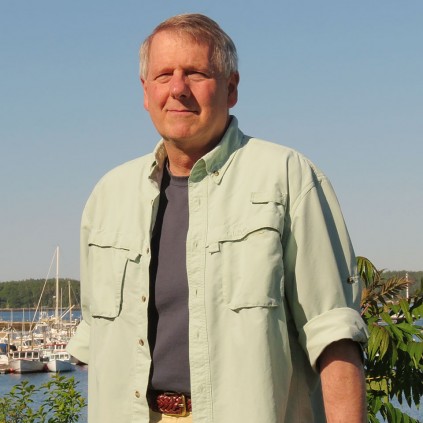Former Directors
Beth Wiemann (2022-2024), Professor of Music

Becoming Director of the MHC after Mike Socolow’s term gave me a great foundation for the first year of my term. He already had the idea of having a high-profile humanities scholar come to cap off the celebration of the Center 10th anniversary in 2022. This idea became, over the summer of our change in leadership, the opportunity to host Heather Cox Richardson on our campus in the Fall of 2022. This significant public event, part of UMaine’s Homecoming weekend, brought a significant number of people to the Collins Center for the Arts, many of whom had not heard of the MHC before. Richardson was interviewed by MHC Board member and UMaine alumnus Brian Naylor, about the importance of the humanities in our current political climate. Richardson stayed on stage well past the end of the lecture, greeting each person who wanted to speak with her, and passionately interacting with everyone she saw.
The Center followed up the next fall with another well-known artist and scholar, Rhiannon Giddens. Working with the Collins Center, we hosted a talk with Giddens before she and her band performed live at the CCA, bringing some people to our campus for the first time. The interview, led by Prof. Jack Burt, was unusual in that Giddens was on strict vocal rest outside of her concerts, so she had her colleague read her answers to the crowd. At one point, she was excited enough to reach for a microphone to speak, but the audience emphatically told her not to try to talk herself. The whole event made for more awareness of the MHC, in addition to showing the connections possible when a performer makes the scholarship around the music she’s playing a part of her live performing.
Later that year, the MHC hosted cartographer Margaret Pearce for a 3-week residency with undergraduate and graduate students in history and allied fields. This model, bringing our guests into classrooms, in more intimate settings such as workshops, is now a template for many of the visiting scholars supported by the Center.
I had great support in my time at the Center, especially from the Humanities Specialist Brian Jansen and the College of Liberal Arts and Sciences staff. Like all of my predecessors, I think the experience of working to support students and faculty working within the humanities and arts is one of the most important things I have done at UMaine, and I know that those following me will feel the same.
Michael Socolow (2020-2022), Associate Professor of Communication and Journalism

I was lucky enough to assume the directorship of the McGillicuddy Humanities Center shortly after Professor Margo Lukens and Humanities Specialist Karen Sieber submitted the Wabanaki Resource Portal project application to the National Endowment for the Humanities. In May, 2021, the NEH awarded a grant for the project, making it the first successful NEH grant earned by the Center in its history. I also supervised the completion of a collaborative strategic planning process begun by Lukens and Sieber in spring, 2020, resulting in the development of a group of strategic priorities to help guide the Center over the next five years.
Despite issues related to the COVID-19 global pandemic, the Center continued to develop. In 2020-2021, the Center funded projects related to the impact of COVID such as Assistant Professor of English Kathryn Swacha’s public storytelling project, titled “Coping with COVID,” and the Center’s own “Maine Remembers the Coronavirus” public memory project. We adjusted and adapted, mobilizing our online presence with more YouTube videos and regular posting across multiple social media platforms. To improve communication with our constituents and the wider community, we inaugurated a monthly newsletter (archived here) to help promote events sponsored and produced by both the Center and the wider University of Maine humanities community. The MHC newsletter offers news and updates, as well as sections alerting faculty to grant opportunities and noting recent achievements (and publications) of note. You can sign up for it here.
The Fellows Program continued to grow, attaining its full complement of eight fellows per year in 2020-2021. In 2022, Sarah Penney, a 2021 graduate, became the first Fellow to serve on our Advisory Board. In 2022, Brian Jansen, Ph.D. joined the Center as the Humanities Specialist, serving as the primary mentor and advisor to our Fellows.
Finally, I was also lucky enough to be director when the Center celebrated its 10th anniversary. Originating as the University of Maine Humanities Initiative, in 2012 a proposal for an official Humanities Center was submitted by then Dean of the College of Liberal Arts & Sciences Jeff Hecker for an internal grant. The proposal was selected and funded by the President’s Office, and within a decade the Center had evolved into a thriving endeavor supporting a wide variety of activities and compiling a long list of achievements. Celebrating the Center’s growth and success proved enormously gratifying, and I was honored to have been the director at this moment in its history.
Margo Lukens (2018-2020), Professor of English
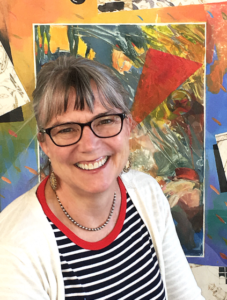
On July 1, 2018, I began my term as the fifth director of the McGillicuddy Humanities Center. I took on this responsibility knowing how well my predecessors positioned the Center. We had an endowment from Clem and Linda McGillicuddy, a dedicated and active Executive Board, a widely-representative faculty advisory board who do not seem to want to “term out,” a freshly painted and furnished space, and excellent staff support.
Throughout my term I was committed to supporting faculty and student projects that express and demonstrate how work in the humanities can make life better. The events and activities inspired by our 2018-2019 annual Symposium, War Without End: a Symposium on the Legacy of World War I, showed the topic’s continued relevance today. The Maine statehood bicentennial celebrations began in the summer of 2019, and provided a timely opportunity for our center to discuss the legacy of colonization in our 2019-2020 annual symposium, Society, Colonization and Decolonization.
The McGillicuddy Humanities Center had to pivot our focus on public engagement in response to the pandemic that has changed all of our lives. The puzzle of delivering classes remotely and creating presentations that can live online became an opportunity. With the expertise of our humanities specialist, Karen Sieber, and other humanities faculty, we considered how to bring the skills and concepts of digital humanities to students in humanities majors, through coursework and institutional support for digital humanities. We continued meeting every two weeks with all of our MHC undergraduate fellows, as they completed their research projects. They astounded us with their serious interest and desire to push forward. We are about to grow our cohort of McGillicuddy Humanities Center undergraduate fellows from six to seven. The new group is diverse and exciting, and ready to dive into their new projects
Although I have loved every minute of it, I think it’s fitting that directors of this extraordinary institution should turn over the privilege of leadership after the brief two-year hitch. I felt, like each of the prior directors, that coming from the faculty ranks with ideas, networks, and passions, I was able to bring it all to bear in the decisions, events and structures I had a part in creating.
Jennifer Moxley (2016-2018), Professor of English
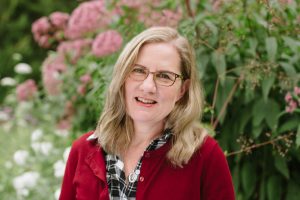
When I took over in 2016, the Humanities Center was a “tween”—no longer a child, not yet a young adult. Buoyed by faculty, administrative, and staff support—as well as the optimism of our Executive Committee—I was privileged to oversee such an amazing growth spurt in the Center that by the end of my term I felt no qualms handing over the keys.
Some highlights of my directorship: when long-time supporters Clement and Linda McGillicuddy gave us a new name; moving into and furnishing our first physical space at 110 South Stevens; working with my assistant Katrina Wynn; her stellar makeover of our webpage and supercharging of our social media; working with the Humanities Student Task Force to design an Engaged Black Bear Digital Badge; developing a Humanities Undergraduate Fellows program; supporting the impressive research and generous programming of my colleagues. I could go on. From a purely personal (and perhaps selfish) standpoint, becoming director did exactly what I had hoped: it put me in rooms with intelligent and inspiring people. People who needed no convincing that—though intellectually challenging and even emotionally risky—the study of the Humanities equips us with the knowledge and resilience needed to live a productive, balanced, and meaningful life.
Liam Riordan (2014-2016), Professor of History
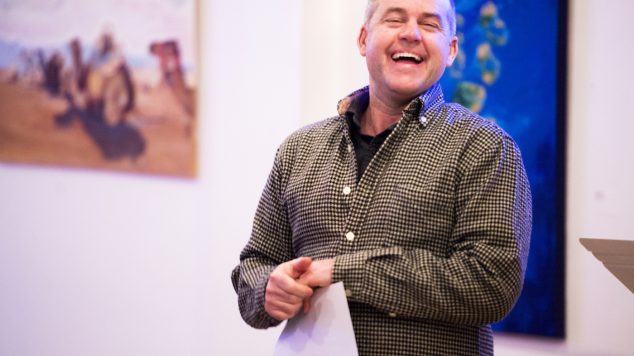
Justin Wolff (2012-2014), Professor of Art History
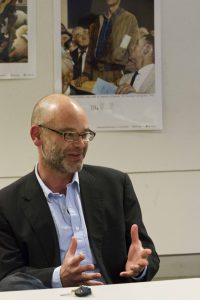
During my term as director the MHC was known as the University of Maine Humanities Initiative (UMHI). In 2014, with significant help from administrators and development officers, we intensified fundraising efforts and raised our profile, bringing our message to alumni and legislators in Washington, D.C. The UMHI also organized two Maine Humanities Summits, in 2013 and 2014, in Augusta. The daylong events featured papers and panels by UMaine administrators and faculty; humanities scholars from other Maine colleges and universities; and humanities professionals from the Maine Humanities Council, National Humanities Center, and American Academy of Arts and Sciences. These ambitious initiatives helped us refine our mission and communicate our objectives to donors. By 2014 the UMHI had become a Humanities Center with a growing endowment.
From 2012 to 2014 we formalized several of the programs that form the foundation of today’s MHC. The UMHI introduced substantial faculty grants to support humanities research at UMaine, developed a program of annual symposia, and sponsored the first Bangor Humanities Day. The inaugural symposium (2013), Bibliopoetics: The Art and Future of the Book, was organized in collaboration with the National Poetry Foundation and featured an international roster of speakers addressing topics including electronic libraries, digital publishing platforms, and digital manuscript studies. The second annual symposium (2014), In and Out of Place: Finding Home in Franco America, was organized in collaboration with the Franco American Centre.
Scott See (2010-2012), Professor of History and Canadian Studies
